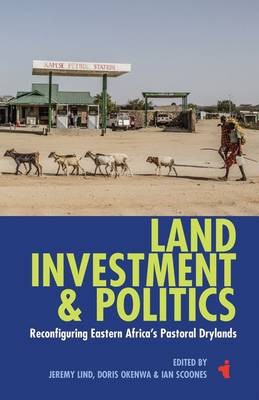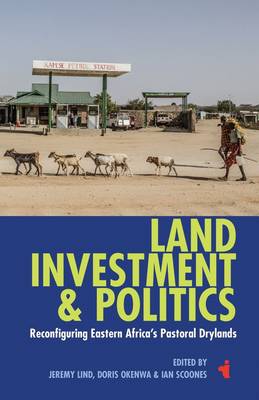
- Afhalen na 1 uur in een winkel met voorraad
- Gratis thuislevering in België vanaf € 30
- Ruim aanbod met 7 miljoen producten
- Afhalen na 1 uur in een winkel met voorraad
- Gratis thuislevering in België vanaf € 30
- Ruim aanbod met 7 miljoen producten
Zoeken
Land, Investment & Politics
Reconfiguring Eastern Africa's Pastoral Drylands
€ 48,45
+ 96 punten
Omschrijving
Examines the new challenges facing Africa's pastoral drylands from large-scale investments and how this might affect the economic and political landscape for the regions affected and their peoples.
More than ever before, the gaze of global investment has been directed to the drylands of Africa, but what does this mean for these regions' pastoralists and other livestock-keepers and their livelihoods? Will those who have occupied drylands over generations benefit from the developments, as claimed, or is this a new type of territorialisation, exacerbating social inequality?
This book's detailed local studies of investments at various stages of development - from Kenya, Tanzania, Somaliland, Ethiopia - explore, for the first time, how large land, resource and infrastructure projects shape local politics and livelihoods. Land and resources use, based on ancestral precedenceand communal practices, and embedded regional systems of trade, are unique to these areas, yet these lands are now seen as the new frontier for development of national wealth. By examining the ways in which large-scale investmentsenmesh with local political and social relations, the chapters show how even the most elaborate plans of financiers, contractors and national governments come unstuck and are re-made in the guise of not only states' grand modernist visions, but also those of herders and small-town entrepreneurs in the pastoral drylands. The contributors also demonstrate how and why large-scale investments have advanced in a more piecemeal way as the challenges of implementation have mounted. JEREMY LIND is Research Fellow at the Institute of Development Studies (IDS), University of Sussex. DORIS OKENWA holds a PhD in Anthropology from the London School of Economics. IAN SCOONES is a Professorial Fellow at the IDS, University of Sussex and co-director of the ESRC STEPS Centre.
More than ever before, the gaze of global investment has been directed to the drylands of Africa, but what does this mean for these regions' pastoralists and other livestock-keepers and their livelihoods? Will those who have occupied drylands over generations benefit from the developments, as claimed, or is this a new type of territorialisation, exacerbating social inequality?
This book's detailed local studies of investments at various stages of development - from Kenya, Tanzania, Somaliland, Ethiopia - explore, for the first time, how large land, resource and infrastructure projects shape local politics and livelihoods. Land and resources use, based on ancestral precedenceand communal practices, and embedded regional systems of trade, are unique to these areas, yet these lands are now seen as the new frontier for development of national wealth. By examining the ways in which large-scale investmentsenmesh with local political and social relations, the chapters show how even the most elaborate plans of financiers, contractors and national governments come unstuck and are re-made in the guise of not only states' grand modernist visions, but also those of herders and small-town entrepreneurs in the pastoral drylands. The contributors also demonstrate how and why large-scale investments have advanced in a more piecemeal way as the challenges of implementation have mounted. JEREMY LIND is Research Fellow at the Institute of Development Studies (IDS), University of Sussex. DORIS OKENWA holds a PhD in Anthropology from the London School of Economics. IAN SCOONES is a Professorial Fellow at the IDS, University of Sussex and co-director of the ESRC STEPS Centre.
Specificaties
Betrokkenen
- Uitgeverij:
Inhoud
- Aantal bladzijden:
- 224
- Taal:
- Engels
- Reeks:
- Reeksnummer:
- nr. 40
Eigenschappen
- Productcode (EAN):
- 9781847012494
- Verschijningsdatum:
- 15/05/2020
- Uitvoering:
- Paperback
- Formaat:
- Trade paperback (VS)
- Afmetingen:
- 137 mm x 213 mm
- Gewicht:
- 317 g

Alleen bij Standaard Boekhandel
+ 96 punten op je klantenkaart van Standaard Boekhandel
Beoordelingen
We publiceren alleen reviews die voldoen aan de voorwaarden voor reviews. Bekijk onze voorwaarden voor reviews.







